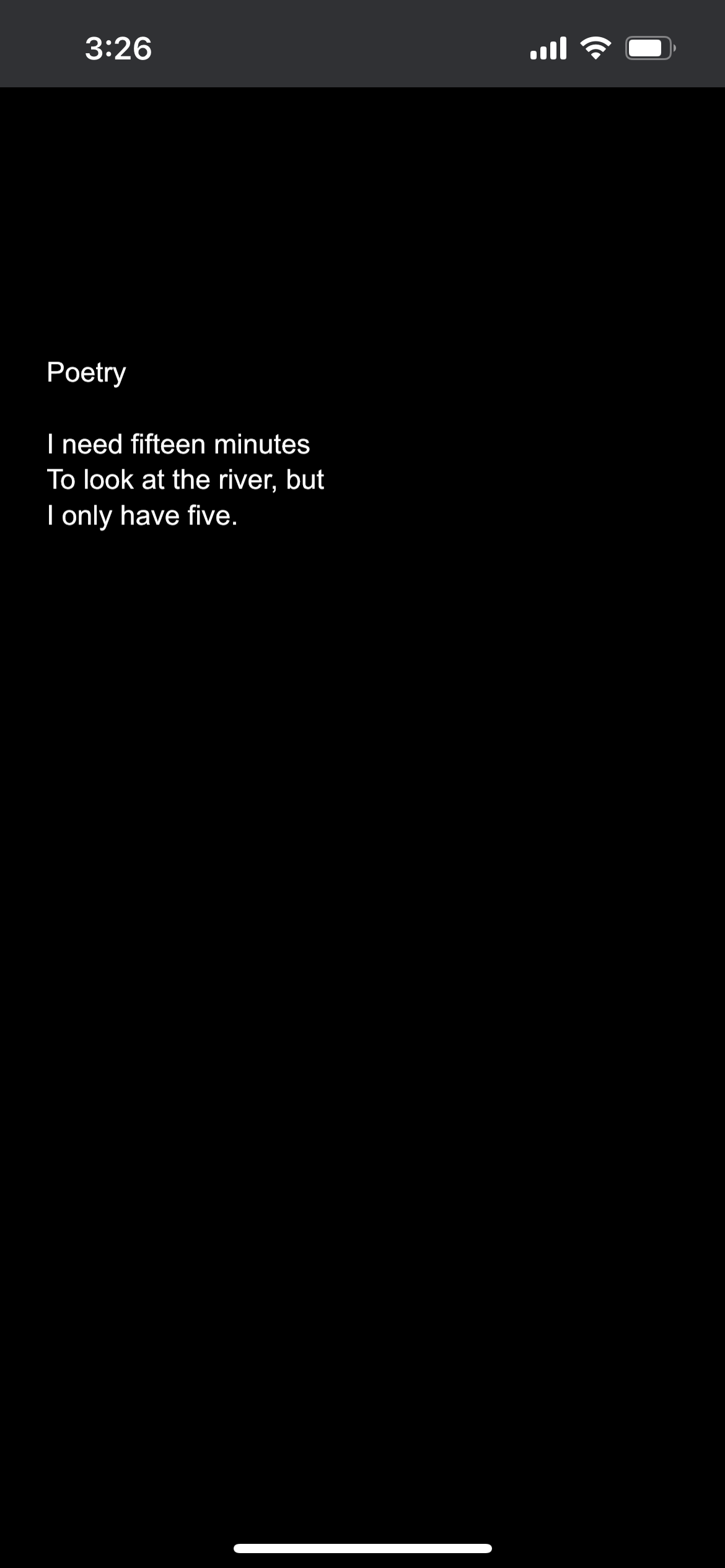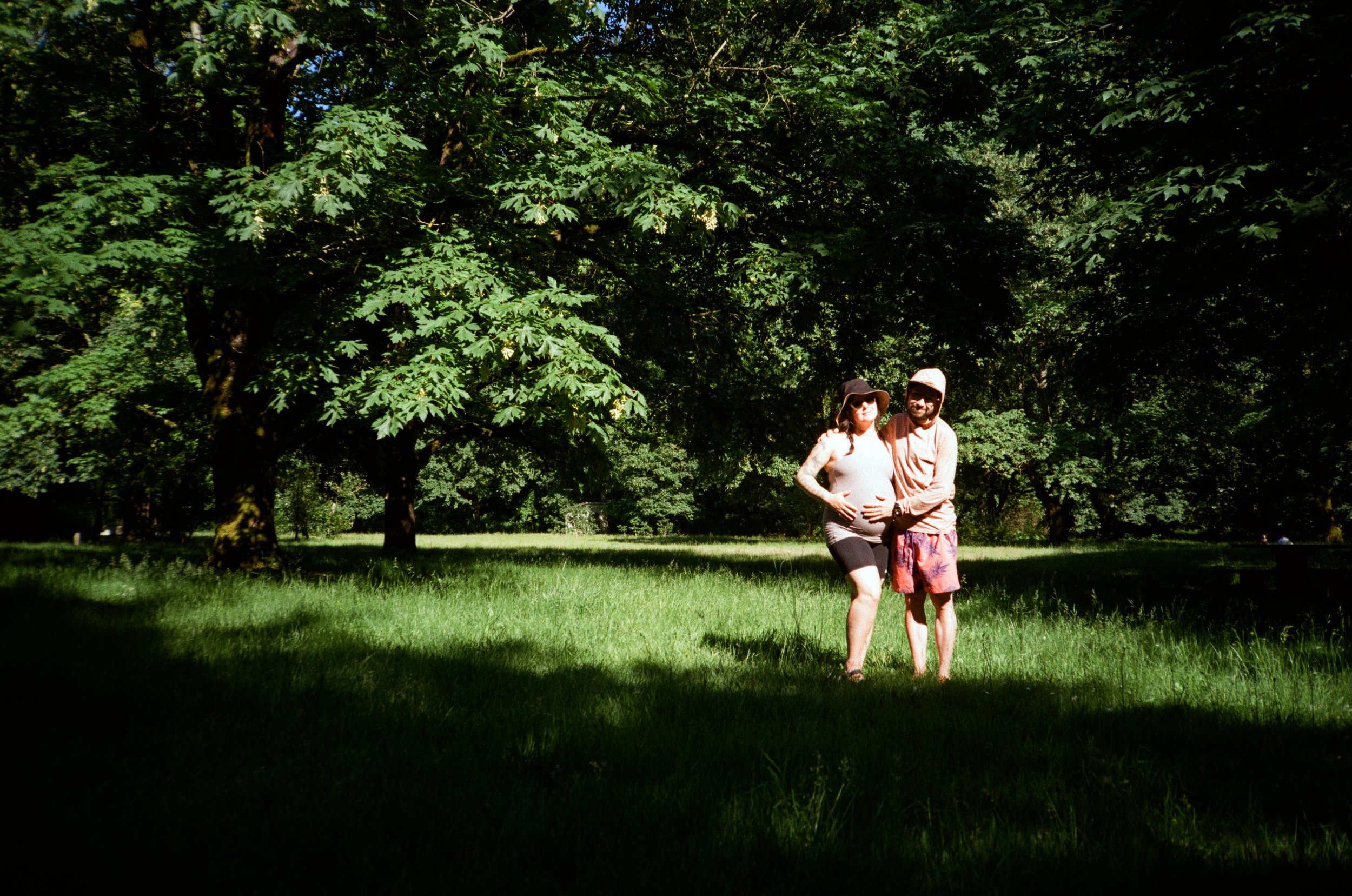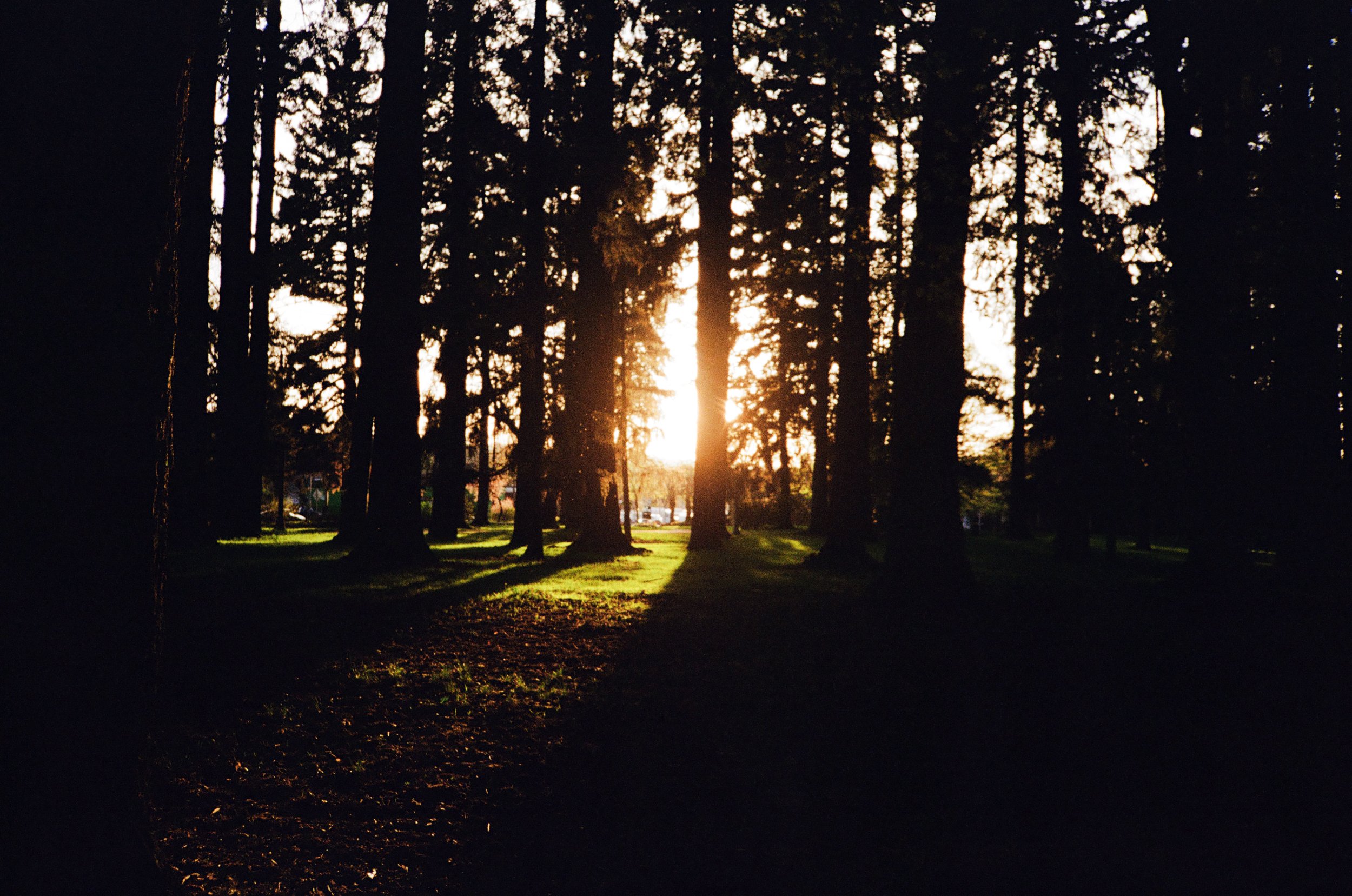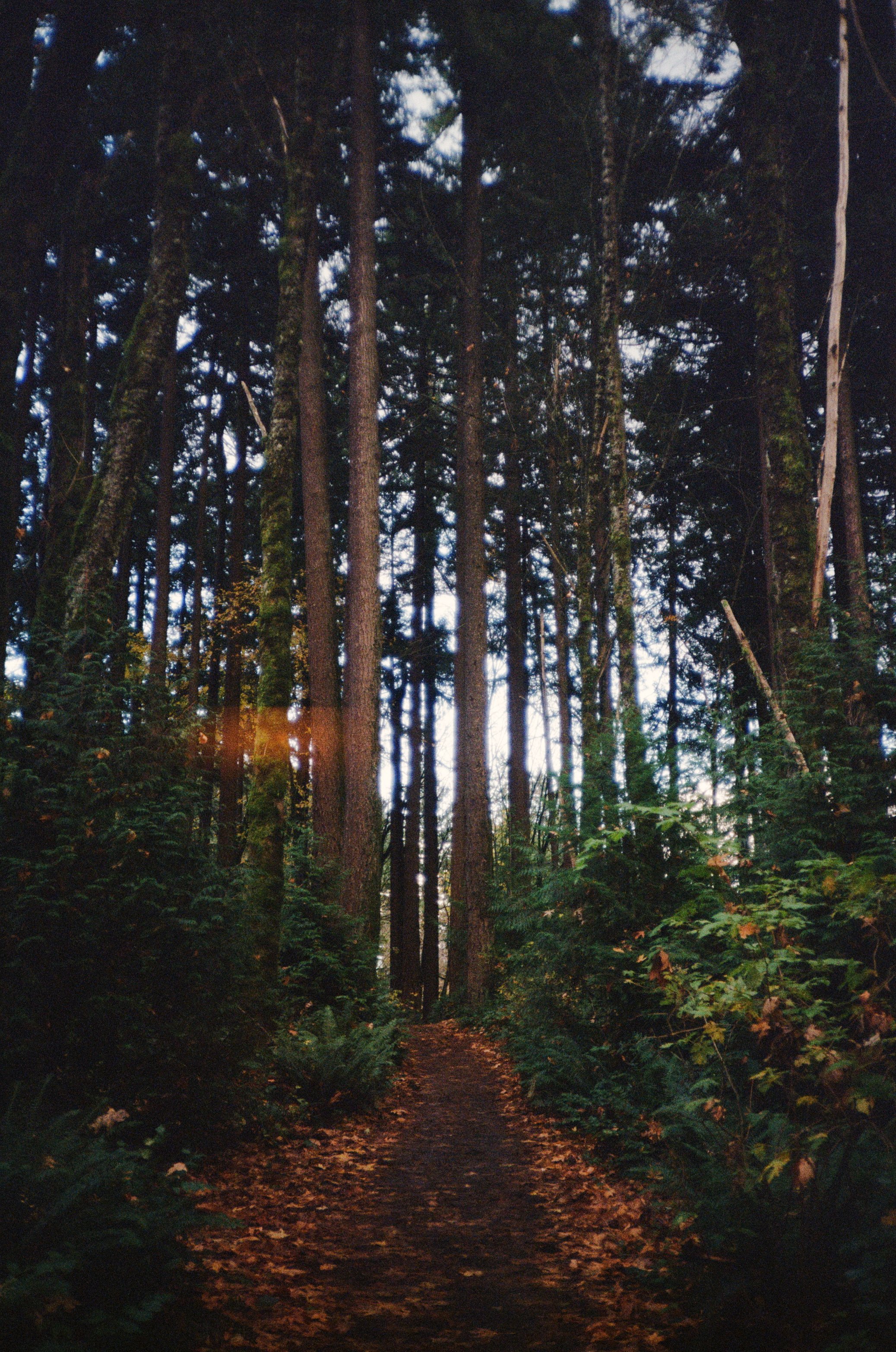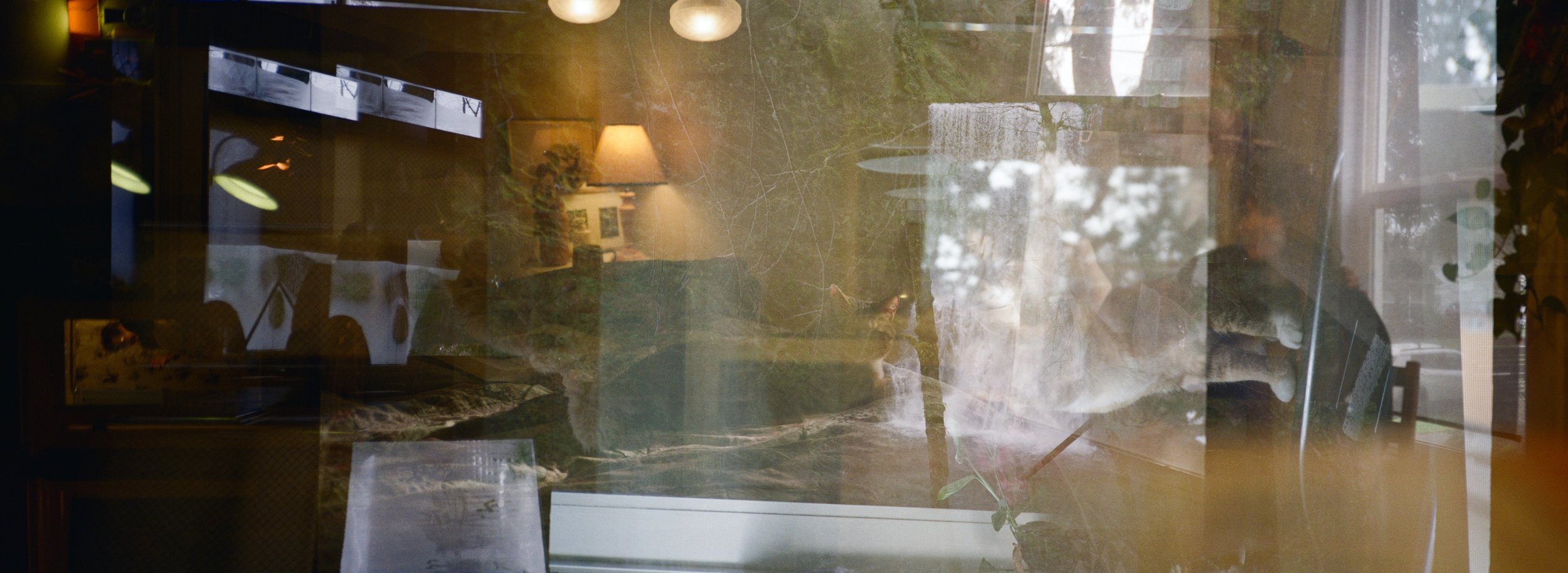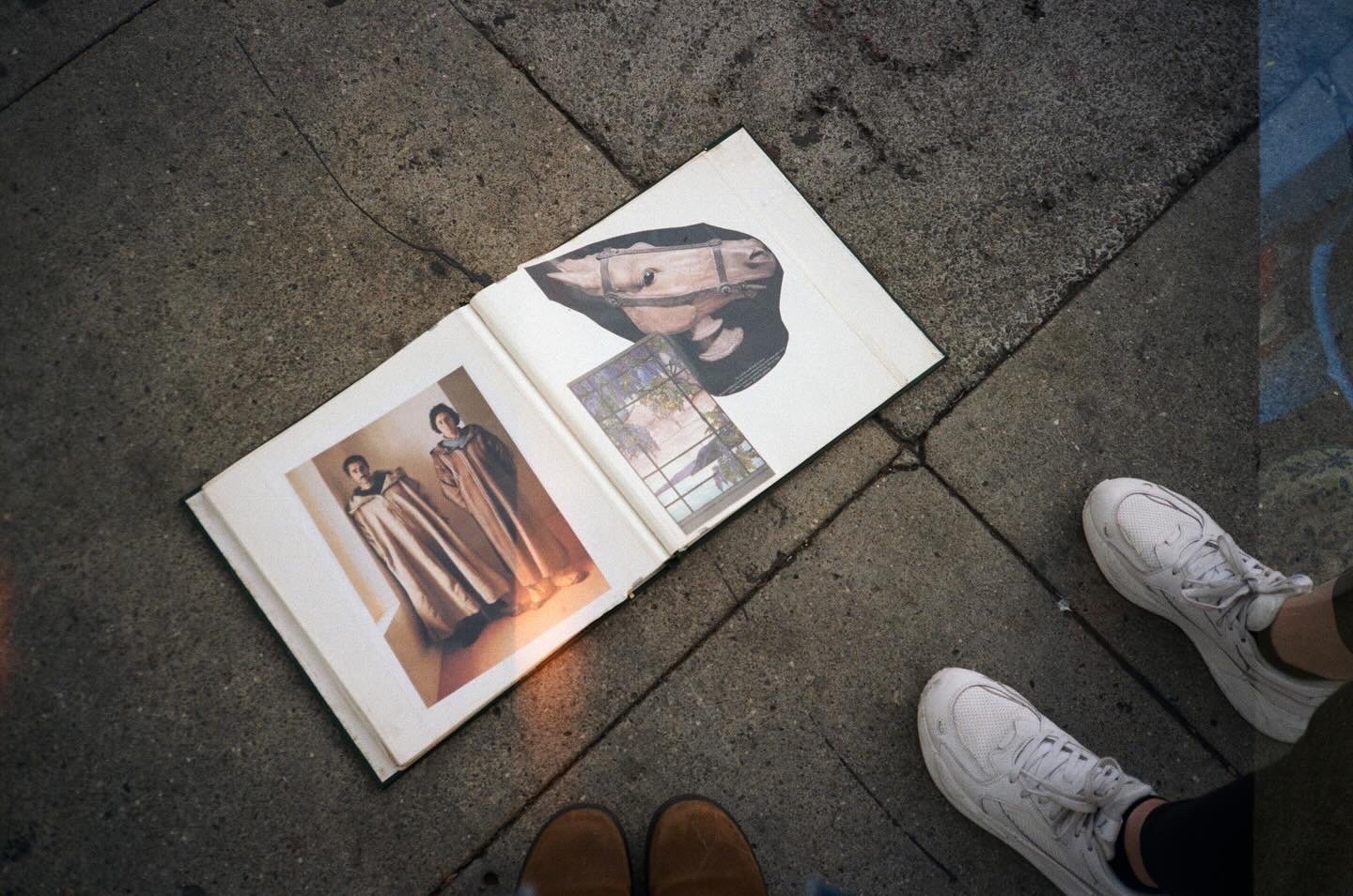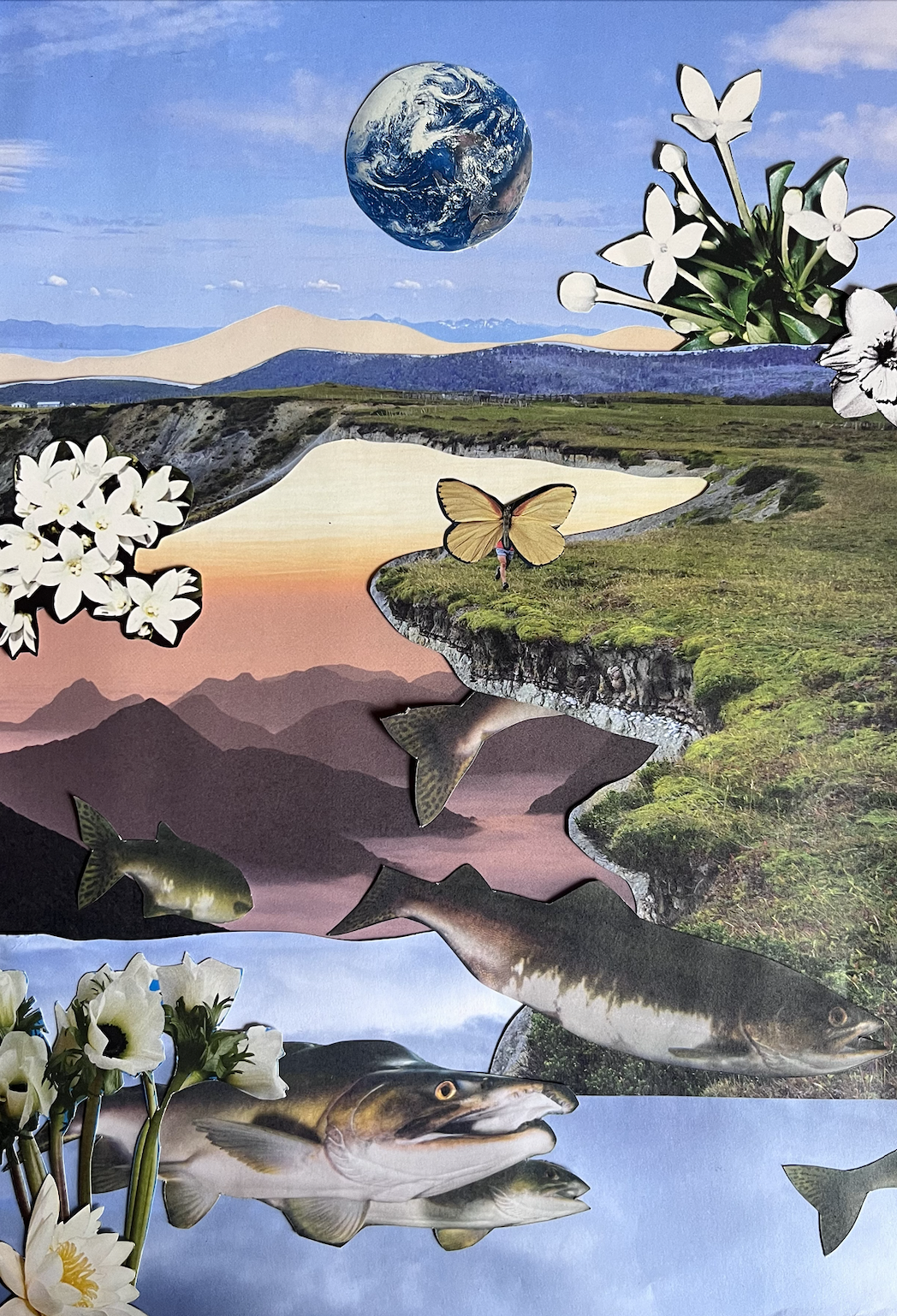I made my Substack, Boring Miracle, a few weeks into my postpartum journey this summer. The mental load of transforming into a mother and learning a new, unfamiliar WYSIWYG editor felt like way too much to commit to. But I made one post and will continue to post here, I think. I THINK.
If you like what you read here, I invite you to subscribe. (( Am gritting my teeth trying not to add some self deprecating comment, in favor of letting my authentic desire to get subscribers um, blossom or something!!)) Expect very un-edited writing on parenthood, poetry, relationships, the planet, existence or whatever else swims into my view at night when I am trying to sleep.
Love you.
As I’ve written into my second chapbook, I’ve been thinking back on the writing and editing I did around my first chapbook unusual light source (still available at White Stag - along with several other excellent titles (I recommend Good River and Millennial, but the whole catalog is solid!))
From unusual light source, 2018 – man, I love my little dashes!!
Chapbooks are often born in community, with a DIY spirit. I’m still grateful that editors at White Stag Publishing took a chance on my work early on. The poems in that felt like a cap on my graduate school experience - it wasn’t everything from my thesis, but a select group of poems that fell together, almost a warm up to my first full length attempt. Chapbooks are such an important part of poetry and whenever I find them in the wild, I’m immediately drawn to them. The rules for chapbooks seem slightly different, making them grounds for experimentation, or just enough space to cover a specific subject or form.
For me, writing into my new chapbook has opened the door for what is hopefully a new full length. There’s always a strange period of time where I have to let the poems settle and breathe. From there, as I read and re-read and edit and un-edit and spiral - the thing either closes in on its final form, or tells me I’m not quite done yet. That’s what’s happening now. I thought I had a chapbook, titled “Fourth Trimester” (take a wild guess as to the subject matter ) – but ultimately that’s a little too neat. There remain several enormous, swallowing questions that may take me another decade to address. Poetry is an iceberg.
I’m like five clicks away from printing these incredibly specific bumper stickers.
late night feedings
When I was in middle school, I stole a copy of The Norton Anthology of Poetry from the public library. I didn’t have to do this. I had negative reasons to do this. Of course I had a library card, and my mom also worked at the library, so I truly had no excuse to slip it into my bag and remove it permanently from the library’s collection (yeah, it never went back). I’m not sure what mood struck me, but I was teenaged and perhaps I didn’t want to talk to anyone that day. I exited the library via the side door, which opened to courtyard overlooked by a beautiful Tiffany glass windowpane – the only witness to my petty crime.
Very belated apologies to the staff of the Troy Public Library who did not and probably still do not get paid enough. p.s. do you guys like my blurry screen shot????
I don’t know where that book is now but I loved carrying it with me for a time. I was always fascinated by the Romantics. Blake’s tiger, Keats’ Grecian urn, Coleridge’s crags. Their work met my early expectations of what a poem was required to do in order to be a poem. I loved the humanity and terror and beauty, even if I didn’t have the patience to close read enough to understand what they were talking about at the time (this impatience is a uh, unfortunate theme in how I read).
Recently, the endless exchange of lasts for firsts has been a hard pill for me to swallow as a new mom. Next week I will return to work on a full time schedule. I have allowed myself to cry about it whenever the need to arises, which is apparently often. Becoming a mother has condensed and lengthened what I can experience “in the moment.” Initially the experience of having a newborn was that of a boring miracle. It was so incredibly quiet and dull at times, yet the crushing terror of being responsible for another human life was (is) so wholly overtaking. It is sublime (exactly the sublime of the Romantic poets). For a few infinite seeming weeks I took baby to the garden to stand and sway in the morning sun. I am relieved when we make it through the cave of night together. Motherhood has been so much more romantic (lowercase “r”) than I could have anticipated. Every squeak and yawn that slides into slumber. Seeing him recognize my voice for the first time, and really, actually see me when he looks at me. Watching his eyes move beneath half closed lids. His parade of new sounds and skills. Watching his eye color change from a bright grey into exactly the color of my own eyes…
Reading has been a surprising balm since my son’s birth. Surprising only because how the hell am I finding time to read books? But I am. In fact, I’m reading more than I have in the past few years. Reading has always been a comfort. Growing up, my mom would frequently come home with a bag filled with new books for me and my brother. I typically took the entire stack to my room and tried to read all the books in one night. Even then, I loved to stay up late reading. My anxiety – which was usually stuck on loud even at seven years old – felt tamed or at least in good company.
In an effort to feel less lonely in the wilderness of new motherhood, I’ve read a number of books by writers who became parents and then had to grapple with the loss of their freedom (both perceived and real.) I love the dry, knowledgeable tone of Rachel Cusk’s “A Life’s Work”. She balances her wit against a frenzy that speaks to me. Her book was apparently criticized widely when it was released in 2001. I’m not surprised – her honesty about the experience wasn’t wrapped in pastel bows and inauthentic gratitude - the highest of crimes for new mothers. It’s a strict and unspoken rule that every pitfall you speak to MUST be wrapped in something that invalidates its discomfort (for example: “I haven’t slept more than 2 hours at a time in six months – butthebabyissosweetandthebestthingthat’severhappenedtome.” (note: this is fortunately not my experience, but I hear it is common.)) The complexity of Cusk’s emotions sometimes had no resolution, things were dirty and milk soaked. When she attempted to reclaim parts of her old life she found them missing. She was sleep deprived, dumbfounded and confused by all the contradictory messages mothers received. She was angry, suspicious of other mothers, hated the way her life suddenly pulled towards predictability etc. All of this is exactly why I loved the book.
In one of the final chapters, Cusk mentions re-reading a favorite Coleridge poem, “Frost at Midnight.” She had apparently never paid attention to the baby in the poem before. I sat up a little bit when I read that. There’s a baby in that poem? I immediately went to my phone to re-read the poem myself. I was shocked. So much of the poem surrounds the baby and like Cusk, I had also completely ignored or forgotten its presence. Coleridge dreams and wonders/wanders (you know, it is kind of his thing) across an evening, musing on frost forming on the window pane, the dying fire and his son’s peaceful sleeping. I’m connected immediately. Instead of a fireplace, I have the dim glow of my phone, my notes app, a window filled by a tree, and importantly, a sleeping babe.
Samuel Taylor Coleridge, from “Frost at Midnight”
I feel like Coleridge was trying to watch his baby’s chest rise and fall with breath, maybe reaching out to place a hand on his stomach every so often just to make sure…………….. 🫠
I really love revisiting the Romantic poets. You can feel their hands wringing at the beauty, their drunken tears, their love of their friends. You can feel the wind in the poems, the awe. They love to be nature. When Coleridge*** says “I wandered lonely as a cloud” I know, have always known, exactly what he’s been talking about. Re-reading “Frost at Midnight” at some odd hour of another night, waiting for my son to wake up for his first overnight feeding, I felt at home (well, because I was) and in the company of another creative new parent, up with his thoughts.
But there, in the poem’s last stanza, I found myself suddenly several layers deep in writers I love.
Samuel Taylor Coleridge, from “Frost at Midnight”
I had certainly not revisited the Coleridge poem since reading Mary Ruefle’s “Trances of the Blast.” I had no idea. There is a baby not only in the Coleridge poem, but now in Ruefle’s book. Why had I not seen that before? I never thought to consider the source of the title. I assumed that the genius of Ruefle could not be explained to a reader, only felt. (Yeah, this is kind of my enduring failure as a writer and reader. I am typically content with how something makes me feel and don’t always think to investigate beyond that. Downstream misunderstandings happen less than you’d think though–) After my first reading of it, I had understood “Trances of the Blast” to refer to the strange and hypnotic winding and un-winding of our years past and passing. “Blast” almost had a Big Bang quality to it. It’s one of my favorite books of poetry, if not my favorite. “Argot” is usually the poem I tell people is my favorite if I am asked (I don’t really like the question but this poem is perfect to me. It is equal parts simple and mysterious. It TELLS YOU HOW TO READ IT!!!)
However, it’s really Ruefle’s “Saga” that now feels in direct lineage with the Coleridge:
Everything that ever happened to me
is just hanging—crushed
and sparkling—in the air,
waiting to happen to you.
Everything that ever happened to me
happened to somebody else first.
I would give you an example
but they are all invisible.
Or off gallivanting around the globe.
Not here when I need them
now that I need them
if I ever did which I doubt.
Being particular has its problems.
OOF. I could go on about what I understand “trances of the blast” to mean now, but what really struck me about finding Ruefle nestled in Coleridge nestled in Cusk was how hopeful it made me feel. It is an incredible example of what reading and writing (weaving, collaging, borrowing, stealing, building upon) can do. Those nights I’d huddled over baby like his breathing was the fire that first lit the universe, I’d done so in incredible company. The poetry I wrote during my fourth trimester, in my own secretive frenzy, turned away from baby for as long as I could bear it suddenly feel connected to a lineage that I was only able to see once I became a mother.
*** 4/11/25 - lol sorry to WORDSWORTH
Out our bedroom window is a private little yard, with a tall and very dense row of hedges that separate us from our neighbors. The hedge is so thick it immediately invites you to imagine that beyond it is something fantastic, certainly not the neighbor’s shed or their barking dog. Whatever the plant is, it grows up and out, creating a child sized cave in its belly of branches.
One morning, I noticed a gold teacup sitting beside an opening in the hedges. It showed up after a particularly heavy rain in an oddly dry winter. It was likely picked up somewhere else by a crow, with their love of shiny novelty objects, and dropped in the yard when it was too heavy to carry wherever it was carrying it. But the magic in this item is so obvious. It looks very much like a mythical being came out of our hedges and dropped the gold cup in an attempt to entice me into the hedge to explore further. However it arrived in our yard, it has been sitting there now for over a month.
A few years ago, I had a dream there was a magical diner in downtown Oakland, that you could visit only when conditions were spiritually right. Whatever that means! In the dream, I saw it and entered (of course.) The diner was empty aside from two other individuals - a young waiter wiping down the rich green tile walls and bronze counters and one patron toward the back. The other patron, an older woman, warmly invites me over. Suddenly the waiter is in front of me, offering me hot tea in a beautiful porcelain teacup, its insides lined with gold. The older woman nods her encouragement and I sip. The flavor is wheat rich, sugary. I don’t remember what else, the dream changes or I wake up.
proof of poem
I added the cup to a poem, it held such interest for me. It felt like an invitation to do more than sip. But what kind of invitation? It’s true that I believe there is more to life than we can see. I’ve never been a materialist. Holding a leaf or someone’s tiny hand may be physical, but there is something larger those acts do for me – something intangible. I can’t hold what it makes me feel, and what it makes me feel seems more real than anything else. It helps that I want to believe 🛸. We can engage with ~oThErwOrLdS~ at many points in time if we are willing to see them and if we want to. It can be as simple as believing holding a leaf does anything for you beyond the physical act of holding it. (And yes, I am being kind of funny about it to distract from my fear of being judged.)
Imagination does not only refer to the ability to invent something from nothing, but to take all of the somethings, small and large, that you didn’t even know were somethings and construct them anew. There are times I have the feeling of being a satellite dish - my round face perfect for catching a whole lot of somethings. My best days look like walking around doing a whole lot of nothing but receiving whatever I catch in the surf (uh oh another metaphor has entered the chat.) I organize these materials immaterial as I will and serve them to whoever will shows up. I study my constellation, and consider the way others organize and imagine. I suppose that’s art.
In a dream I saw a cup, a beautiful one - and then it appeared in my yard.
How did it appear there, years beyond my dream? How did I know it would be important enough to write about it. More than ever, I need the fantastic. It helps keep combat the nihilism I sense that I am (that we are) surrounded by (or on really bad days, swallowed by (for many this could be most days)). I need to keep hope in touch with my day to day actions. And hope must be an act of imagination, the same way dreaming can illuminate a path forward. If you tune to what you can’t touch.
However, there is an actual gold cup in my yard and maybe it’s time to bring it inside.
proof of cup
From Colorado Review, Summer 2024
One of my favorite things about writing, or maybe I mean language in general (and English very specifically), is that it is kind of a failure. I used to say this to an ex, who really hated when I said it. It seemed that my use of the word “failure” had some loaded or double meaning for them that I could not see and was difficult to explain. I always thought it was funny though, that in any conversation where this came up, language was absolutely failing us (and probably our interpersonal dynamics as well, but what can one do) : I felt the thrill and possibility in how we inevitably use words in ways that others find off or inaccurate, and they felt that it was mean spirited or unkind to point out the difficulties of language as failure.
It’s probably ten years later and I am still thinking about the failure of language.
My creative brain switches on at right around 10 PM. It always has. This is not convenient with an infant, when all conventional advice says to “sleep when the baby sleeps!” Instead of forcing myself to sleep when I simply can’t, I try to do something creative while I wait for my son to wake up for his first feeding which should be soon if the other nights are any indicator of a pattern (but um, often they are not). Usually this means I work on odd sewing or panting or collage projects, or read a little bit (I’m re-reading “How to Do Nothing”, which Jenny Odell wrote partly in reaction to the 2016 US election (so following both birth and the 2024 election, it puts me in touch with some life affirming practices)) – but often I am scrolling on Reddit (not a life affirming practice, but–). I come across a post in a forum for new parents titled: “Birth is traumatizing.”
The post is about how the new mother can’t recognize their own experience in portrayals of pregnancy and labor in popular media and fiction. Totally fair. Birth is always portrayed as some connected, easy, blissful miracle OR low comedy with over the top lamaze breathing and screeching. The writer believes that birth is such a powerful experience, that it changes your life forever and takes time to recover from, always physically and sometimes mentally. They wish the world wasn’t so out of touch with the experience of birthing parents. I recognize the frenzied exasperation at the world’s lack of respect for the experience of birthing parents, the “HOW COULD YOU NOT TELL US” tone of the post. Because this post exists on the internet, instead of responding to the grief in the writing, many of the comments on the post focus in on the use of the word “trauma”:
“I don’t know that I would call my experiencing giving birth traumatic.”
“Experiences can vary, my body didn’t feel like it went through a major trauma.”
“I would not make the blanket statement that birth is traumatizing.”
“Almost nothing about birth went like I’d planned, but I wouldn’t call it traumatic”
“I found birth… dull.”
The poster seems to have difficulty connecting their experience to others, and ultimately that tension has generated several small back and forth’s in the comments section, as comment sections are known for. (Kind of a topic for some other time, but this is also an example of how the internet is not a effective replacement for community conversation - but I spend time there, with thousands of other new and nervous parents, and that’s where this spiral thought originated, so here we are). It’s not traumatic, it’s something else. For many it’s not traumatic, it’s difficult or challenging or unexpected. It’s life changing. For someone it was “dull”! But traumatic?
I loved being pregnant, which I know, is lucky. I felt the healthiest and was the happiest I’ve ever been in my body. I loved how big and round my stomach was, I loved all the splotches and marks that popped on my face after being in the sun. In spite of being exhausted and having a hard time eating, I would take myself on long walks and talk to the baby about what I saw - the birds, ferns, trash. I felt connected to myself and to the mystery growing in me. Time expanded and contracted in novel ways.
Even in the easiest labors, I would argue the act of giving birth is a kind of necessary trauma, certainly violent. A portion of your body removes itself or is detached from you, and then in the best case scenario, continues to grow and live in the world separate from you. For me, birth was traumatic in the way I think people are responding to in the post. Not without beauty, but traumatic. As much as I prepared for birth, the event happened suddenly, and to me. So much literature I saw about birth recommended, studied, and praised the idea that I should “let go” and trust that “your body will know what to do.”
About a decade ago, a friend and I were discussing the birth in Maggie Nelson’s “The Argonauts”. In the book, “labor does you.” I could not understand. My friend felt that the description of labor was “emotionally manipulative” (language success?? or failure?? what writer doesn’t aim for some emotional manipulation?? What do I mean by manipulation!?). I remember “The Argonauts” being powerful and I cried through a good portion of the end of the book, but couldn’t really tell you why then, so perhaps I had been manipulated. Now I could tell you why I cried - but if I had to explain it to you, I guarantee that language would fail me. I recognize a complex truth in the writing. I will spend good amount of time trying to air out the emotion of my labor in writing. It’s one reason I write, to uncover the complex truths for myself. Ultimately I know however it is described, it will never connect with a reader exactly as I mean it. My friend and I are overdue to revisit this conversation, as we are now both mothers and wives.
I may be misremembering, but Nelson described labor as a space that felt “low” – a nowhere. Instead of being able to “let go,” control of my body and my mind was forcefully pried from me. I didn’t go somewhere low, I went into non-existence. I rode the waves of pain to the center of the universe, which contained nothing. I had no body, I had no baby, I had no home planet. This isn’t a post about my labor though.
The failure of language is exactly what makes writing so worthy of devotion. Inaccuracy is a generator. My effort is to get my words as close to my felt truth as I can, and even then, you will not be able to come with me. Reading will spawn other thoughts in your mind and you will be sent on a journey of your own, separate from mine. In every phrasing, there is the possibility of a birth. It may make you reflect on how dissimilar/similar/unique your own experiences are. You may fixate on a word like “home” or “planet” and off you go, to the playful space where you will certainly have your own language failures.
(I wish I could show you the amount of parantheticals, “possiblies” and “maybes” I had to edit from this post. Not exactly language failure, more about how much work it is to write something that feels paradoxically intimate and casual.)
one thing I am very good at is walking. when I feel clouded or sad or confused or energized or just in need of a perspective shift - I go for a walk. I sort of have to do this every day or I will go a little stir crazy with my own thoughts. walking airs them out. and walking makes them poetry.
since having my son, my usual route is now to go down through my neighborhood about a mile, to the park with the giant trees, defunct swimming pool, tennis courts (turned pickle ball courts) and old street lamps that beg to be painted into Magriette’s universe (they also remind me of the lamp post that guides Chihiro to the good witch Zeniba’s cottage). I like to look up into the trees at the park. one evening recently, I noticed a little sliver of moon beside venus, rising as the night fell. the street lights were just coming on.
that moon looks like a little nail clipping, I thought. It reminded me that when I was probably middle school aged – I liked to latch on to my best friends arms with my nails and make little half moons in their skin. I suppose that sounds violent, but it wasn’t so aggressive as it was energetic, and a little territorial. I’d also create little half moons in my own forearm – again, it really wasn’t about harming myself or anyone, but sort of seeing an impact and having a kind of bubbling over of energy. I don’t have to tell you kids are weird like that. and I imagine it was annoying, but it always got a laugh. I was walking around the park having these memories, then thoughts about the memories – and then of course, remembering what my thoughts were at the time of being young(er) and odd(er) and (less) inhibited with my energy.
I moved on –
anyway it’s a cliche to think of the waxing or waining crescent as a nail clipping, isn’t it? hasn’t this been said in poems or songs or movies? maybe. I can’t recall exactly where I’ve seen it. sometimes cliches become cliches by common observation. english trains you to describe things frequently by using comparison - metaphor and simile are everywhere. the way we all know the sun on the ocean glitters and clouds are puffy like cotton.
and then, I stepped slightly to the side of my initial thought: a thumbnail of the moon.
I was more interested in that thought right away. I had somehow pulled the crescent out of the sky and down into my computer! transformed the enormous yet slender cut of the poets beloved celestial object into a flattened little .jpg on a desktop. I moved it around the screen in my mind. I accidentally “dropped” it and had to go back with my pointy little cursor. I mentally hovered the thumbnail of the moon over the desktop trashcan, then pulled it away and set it back down gently. I was tipsy with the small, silly power granted by my imagination.
and for some reason, instead of running away with the thought into a poem - I immediately went into an investigation of how the moon looking like a fingernail clipping became a thumbnail of the moon. it was not difficult to walk through how I had gotten from the shape of the actual moon in the sky to the fabricated moon, simply through the hinge of the word nail and two very different applications (thumbnail, nail clipping). unusual, but still traceable – a great example of how the mind creates poetry. walking made space for the association, for the slight creativity needed to turn a cliche into something more unique and weird, but still recognizable.
and because I am very unpracticed in writing down these thoughts about poetry, but very practiced at keeping them sort of cataloged in my mind – here is the dismount for this micro essay.
I’ve been waiting to share these poems, some of my favorite I’ve ever written. Encountering this poem again, in the physical journal, while holding my newborn son was really special. It was about him before I knew it was about him. Actually, it was really more about forming my family, about becoming “us”.
Four more poems can be found in the full version journal - which is well worth picking up (the Colorado Review is always worth picking up – they consistently deliver exciting work from both new and tried and true poets and have published a handful of my most admired community members.)
knock knock joke, 2024
the valley, 2024
Columbia Park, 2024
near some railroad tracks, June, 2024
Columbia Park, 2024
Portland, Oregon, 2024
Hoyt Arboretum, Fall 2023
Bed at home, 2024
We released a special issue of Maiden Magazine today. It’s focused on my writing circle, the idea of community and what is possible in a residency. We’re nothing without us MM #3 is a love letter to them.
Join the residency: Maiden Magazine, #3
Together in the haunted house, Portland, OR, 2024
Several corridors later, West Coast, 2023-2024
St.John, Portland, OR, October 2023
horse majeure, San Francisco, November 2023
Honk if you loved Sylvia Plath as a young poet because you recognized her raw power and had not yet been taught by misogyny that “Confessional” poets were to be regarded as lesser poets because of their status as either or all: emotional, woman, self disclosing, etc. but then you come full circle to Plath ten years after your formal education has ended and you are a safe distance from unlearning instinct which seems more and more to do with control and less and less to do with skill or talent and your dear friend reads an excerpt to you from Rachel Zucker’s “what we talk about when we talk about the confessional and what we should be talking about” and your other friend says when she learned she actually loved Plath after years of avoiding her due to internalized misogyny she realized she was a “goddess, fully in her power” and you think hell yeah and your other friend reads “Morning Song” aloud and you feel the first line is etched into your being (still, or forever) and no one can fuck with that perfect, devastating poem.
“Love set you going like a fat gold watch.”
December 2023












